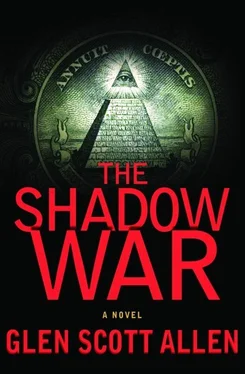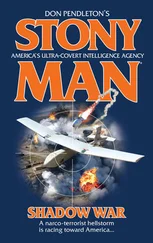Glen Allen - The shadow war
Здесь есть возможность читать онлайн «Glen Allen - The shadow war» весь текст электронной книги совершенно бесплатно (целиком полную версию без сокращений). В некоторых случаях можно слушать аудио, скачать через торрент в формате fb2 и присутствует краткое содержание. Жанр: Триллер, на английском языке. Описание произведения, (предисловие) а так же отзывы посетителей доступны на портале библиотеки ЛибКат.
- Название:The shadow war
- Автор:
- Жанр:
- Год:неизвестен
- ISBN:нет данных
- Рейтинг книги:5 / 5. Голосов: 1
-
Избранное:Добавить в избранное
- Отзывы:
-
Ваша оценка:
- 100
- 1
- 2
- 3
- 4
- 5
The shadow war: краткое содержание, описание и аннотация
Предлагаем к чтению аннотацию, описание, краткое содержание или предисловие (зависит от того, что написал сам автор книги «The shadow war»). Если вы не нашли необходимую информацию о книге — напишите в комментариях, мы постараемся отыскать её.
The shadow war — читать онлайн бесплатно полную книгу (весь текст) целиком
Ниже представлен текст книги, разбитый по страницам. Система сохранения места последней прочитанной страницы, позволяет с удобством читать онлайн бесплатно книгу «The shadow war», без необходимости каждый раз заново искать на чём Вы остановились. Поставьте закладку, и сможете в любой момент перейти на страницу, на которой закончили чтение.
Интервал:
Закладка:
"What happened in 1968?" Benjamin asked.
"You don't remember so-called Prague Spring?" Anton asked, looking surprised. Then he answered his own question. "No, too young. Anyway, Czechs rebel, Soviets send in tanks. Everybody in Soviet Union thinks NATO will invade, help rebels. Sit with fingers on buttons for two weeks. But, pfft, big nothing happens. Except one small something."
Anton tapped at the keyboard again, opened the file labeled "Stzenariy 55."
Borba s tenyu appeared on the screen.
"Yes, we saw that," said Benjamin. "But Samuel had no idea what it meant."
"Click on it," instructed Anton.
Benjamin reached forward, clicked on the text.
A small black border appeared around the phrase.
"It's an image," said Benjamin, "not text."
"Exactly so. Now make bigger."
"How much bigger?" asked Benjamin.
"Much bigger."
Benjamin shrugged, enlarged the image several hundred percent.
What had been the black blocks of text revolved themselves into long columns of numbers and letters. Benjamin saw each column was eight figures wide.
"What on earth…"
"Is octal code," said Anton. "Code computer uses for letters and numbers. Fletcher scanned letter into computer, converted words to octal, hid code in picture."
"Letter? What letter?"
"Letter from Fyodor Myorkin."
"My god," said Benjamin. "Are you able to read this?"
"Kids don't know octal these days. Don't need to. But Anton very old," he smiled, "so, yes, I can read.
"Fletcher writes Myorkin because Myorkin wrote about Cold War years, exposed secrets. Made many enemies. Anyway, Fletcher asked him, ever heard anything about something in sixties, in Siberia, something… stranno, strange? Myorkin writes back, yes, found something in KGB archives in St. Petersburg. About place called Uzhur-4 and something called Stzenariy 55. After Prague Spring, KGB all over the place. People arrested, officers reassigned. Big panic. Myorkin says he will go back to archives next week, but first wants to interview one of few officers from Uzhur-4 still alive. And officer's name interesting, I think. Kapitan Nikolai Orlov."
"Orlov?" Benjamin thought. "Why does that sound…"
"Female version Orlova. Like, for daughter."
"N. Orlova, at the RCC," said Benjamin. "Then it's a woman. And she's somehow connected to this Stzenariy 55, which is somehow connected to the 'wobble' TEACUP found in the Cold War, which the Gadenhower data somehow convinced Fletcher is all part of some enormous conspiracy?"
"Now you understand," Anton said with a mischieveous grin, "why I keep saying, is all maybe."
Benjamin leaned back in the chair. He was still processing much of what Anton had told him. He realized he had reached a point where he didn't even know the right questions to ask anymore.
He looked over his shoulder out the second-story window of Anton's study. He could see a narrow sliver of gray sky. He suddenly wished he were back in his small, safe cubicle in the basement of the Library of Congress, his greatest concern deciphering the spelling in eighteenth-century legal codes.
Anton rose and came over to him.
"You need more sleep," he said.
"No," Benjamin answered. "I still have an appointment to keep at the Library of Congress to look for this diary. Though I still don't see how it could possibly fit into all this."
"Ah, like I said, TEACUP two programs," Anton said. "First half about wobble in Cold War, yes?"
"Yeah," said Benjamin. "I think I understand that now."
"Second half," Anton said, "is other half of graph, about how find same wobble in another war."
Anton waited… and then the answer was obvious to Benjamin.
"King Philip's War," he said, half to himself. But then he frowned. "But that was hardly a cold war. Thousands died, whole tribes were wiped out."
"Think he used this king's war as kind of control, test case, time when conditions completely different than Cold War. To compare, understand?" Benjamin nodded. "But then TEACUP finds same… aberration. Path different," Anton shrugged, "but wobble same."
"You mean… some other invisible influence?"
Anton nodded, then he stood up, stretched again. "But remember, even TEACUP only eighty percent sure. Need two more pieces of data to be one hundred percent. One is this Stzenariy 55, and the other is…"
"The Bainbridge diary," finished Benjamin.
"Maybe," said Anton.
"Well then." Benjamin stood up. "Sounds like I've got a phone call to make, to a Ms. N. Orlova at the Russian Cultural Center." He looked down at Anton. "Do you mind if I use your bathroom to wash up?"
"Please," he said. "Down hall, on left. Hot water slow, so be patient."
"Patience," Benjamin said as he walked off down the hall. "Heard that a lot lately."
Anton listened to the bathroom door close. Then he rose and went to his desk, pulled the phone there close. He dialed a number, listened until someone answered.
"He's leaving," he said. And then, as the sound of running water came from down the hall, Anton continued listening, nodding now and again. Finally he said, "Helluva plan. Damn risky."
Then, his eyes thoughtful and unsettled, he hung up the phone.
CHAPTER 28
Natalya was exhausted. She'd arrived at the Cultural Center at six o'clock that morning. It was now after noon, and she hadn't had a break during those six hours.
First had been checking that the movers were arriving that morning to begin setting up the tables in the main reception hall; then that the decorators would be arriving shortly after that to begin laying out the tablecloths and silverware, as well as the dozens of flowers, garlands, wreaths, and other decorations that she hoped would transform the Cultural Center into something out of a nineteenth-century Tsarist Russia painting.
She disappeared into the kitchen for a moment to grab something to eat. While she was there she decided to check her phone messages at home. There was only one, but it surprised her.
Her father's cousin Olga had called and left a very brief message, telling her just to call her as soon as possible. To hear from Olga at all was strange-she and Natalya were not that close-but even stranger was when she'd left it: 7:00 A.M. Olga probably expected to catch her before she left for the RCC, but since she'd left so early to get ready for the reception, she hadn't been home.
She was about to call Olga back on her cell phone, when one of the assistants came to tell her there was a phone call for her at her desk. Ah, she thought as she made her way upstairs, this must be my father calling to explain Olga's odd behavior.
" Alloa, " she said, expecting to hear her father's baritone " privet " in response.
"Uh… I'm sorry, is this Ms. N. Orlova?"
The voice was clearly American, not Russian.
"Well, this is Natalya Orlova, yes. Who is this?"
"Ms. Orlova." There was a pause on the other end, and she realized the caller was trying to think what to say. "You don't know me. My name is Benjamin Wainwright. I'm a colleague of someone I believe contacted you, perhaps last week. His name was Dr. Jeremy Fletcher."
Natalya held her breath. For a moment, she literally couldn't speak.
"Miss Orlova?" the voice asked. "Are you there?"
"Yes," she managed. She couldn't think straight. "Uh, you said… you said he was a colleague?"
"Yes," the voice said. "I… it's difficult to explain over the telephone."
Natalya's first impulse was to hang up. But she couldn't quite bring herself to do that.
"Who did you say you were?" she asked, stalling for time to think.
"Benjamin Wainwright," said the voice. "I'm… well, I was at the same place where Dr. Fletcher was doing his research. The American Heritage Foundation. In Massachusetts."
Читать дальшеИнтервал:
Закладка:
Похожие книги на «The shadow war»
Представляем Вашему вниманию похожие книги на «The shadow war» списком для выбора. Мы отобрали схожую по названию и смыслу литературу в надежде предоставить читателям больше вариантов отыскать новые, интересные, ещё непрочитанные произведения.
Обсуждение, отзывы о книге «The shadow war» и просто собственные мнения читателей. Оставьте ваши комментарии, напишите, что Вы думаете о произведении, его смысле или главных героях. Укажите что конкретно понравилось, а что нет, и почему Вы так считаете.












